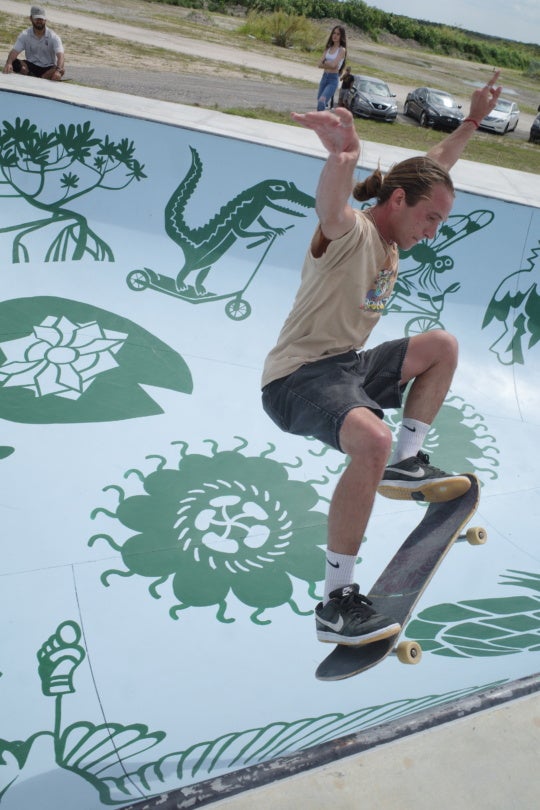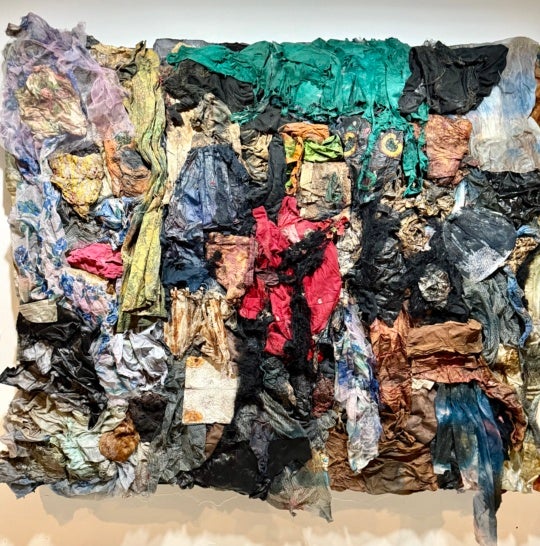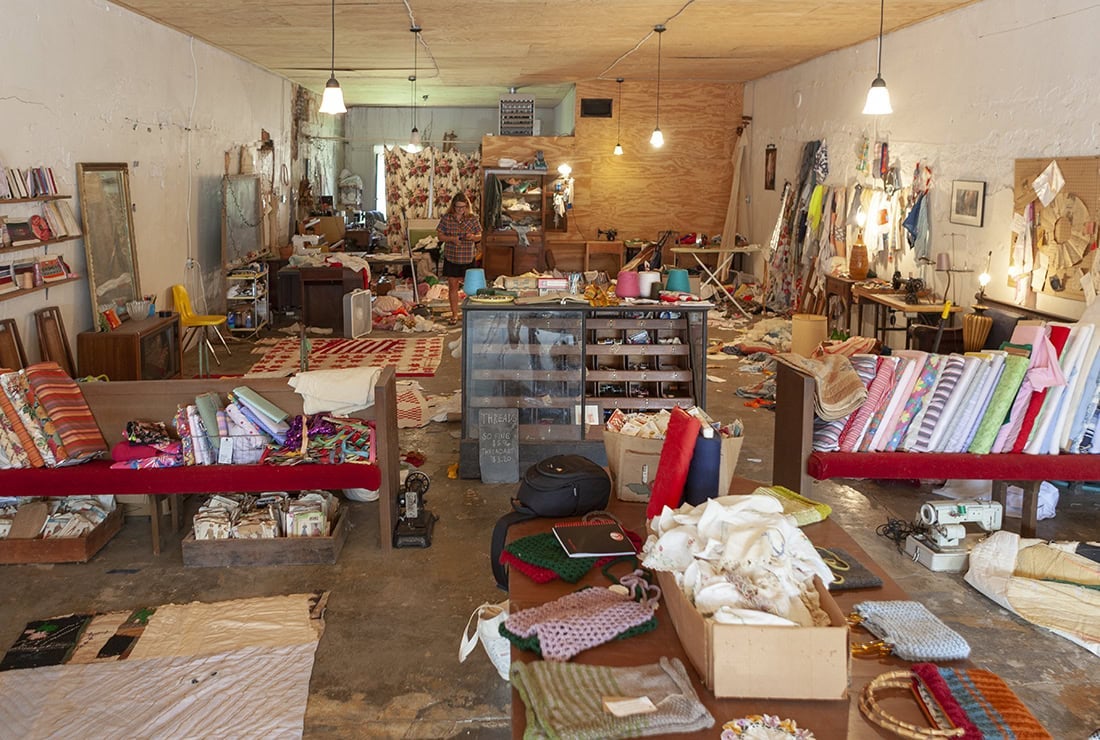
All photos by Carson Keith, 2019.
A lot of people have a whole lot of opinions about the South, but a lot of people don’t live here.
As is the case with many Southern summer road trips, the winding route between Atlanta and Water Valley, Mississippi, is a swath of verdant farm land creased by state highways. Heavy, sluggish heat seeps under your clothes as you travel. By 10 am, a roadside thermometer reads 101 F in a smirking digital glare. Continuing due west, signs that you’re moving into Water Valley—which by name seems to promise a miraculously cool spring that will save you from the heat of high summer—begin to crop up. Rather than offering any such aquatic feature, Water Valley has the air of most small, former-railroad-towns you’ll find throughout the South. On Main Street, the town’s central artery, there’s a meat-and-three restaurant, a post office, a Methodist church, a Shriner’s meeting house, and a hair salon called Hair Trendz. And then, a jewel box: in a modestly shaded, shotgun-style storefront, you’ll find the cloth-plumed studio of artist Coulter Fussell.
In 2015, in a building that hadn’t changed much architecturally since the 1920s, Fussell opened YaloRun Textiles. Named for Yalobusha County—the county seat of which is Water Valley—the space was originally intended to serve as a sewing store and studio for Fussell, who also occasionally taught classes there. Today, the distinctions between these functions have been lost. The space is now, from the front door to the back, entirely claimed by the artist’s working sprawl. If someone in town is looking for sewing supplies, they need only ask and it’s theirs, free of charge: YaloRun no longer operates as a store.
Fussell’s parents still live in her hometown of Columbus, Georgia, itself a historic textile-manufacturing center. Her father, Fred Fussell, worked as folklorist and curator at the Columbus Museum, and her mother, Cathy, is a nationally recognized, traditional hand-quilter. Although Coulter has been around quilting since she can remember, she didn’t make her first fully pieced quilt until the beginning of college because, as she says, she “needed space from what my mom was doing, even if I was interested. I needed to do my own thing.” After earning her BFA from the University of Mississippi in 2000, Fussell began her career as a painter. When asked how she feels about pivoting away from painting, she confesses, “I gotta admit, I learned a hell of a lot more from the ladies quilting on YouTube than I did in a college class. I’m glad those ladies know what they’re doing.”
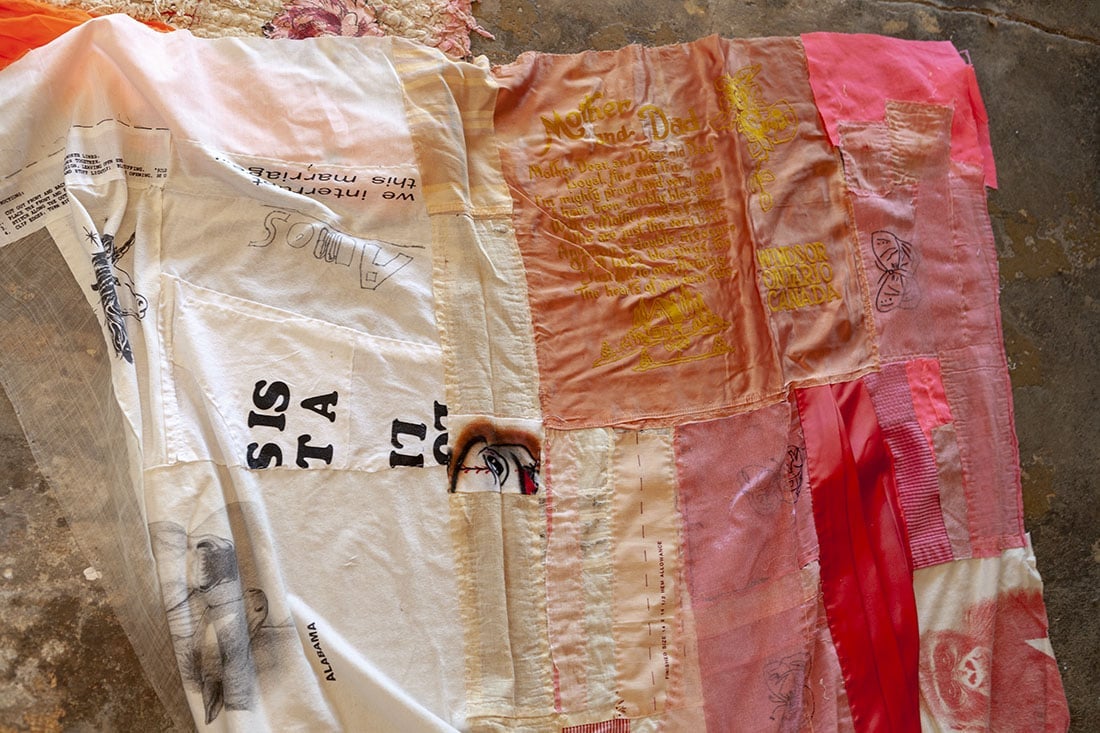
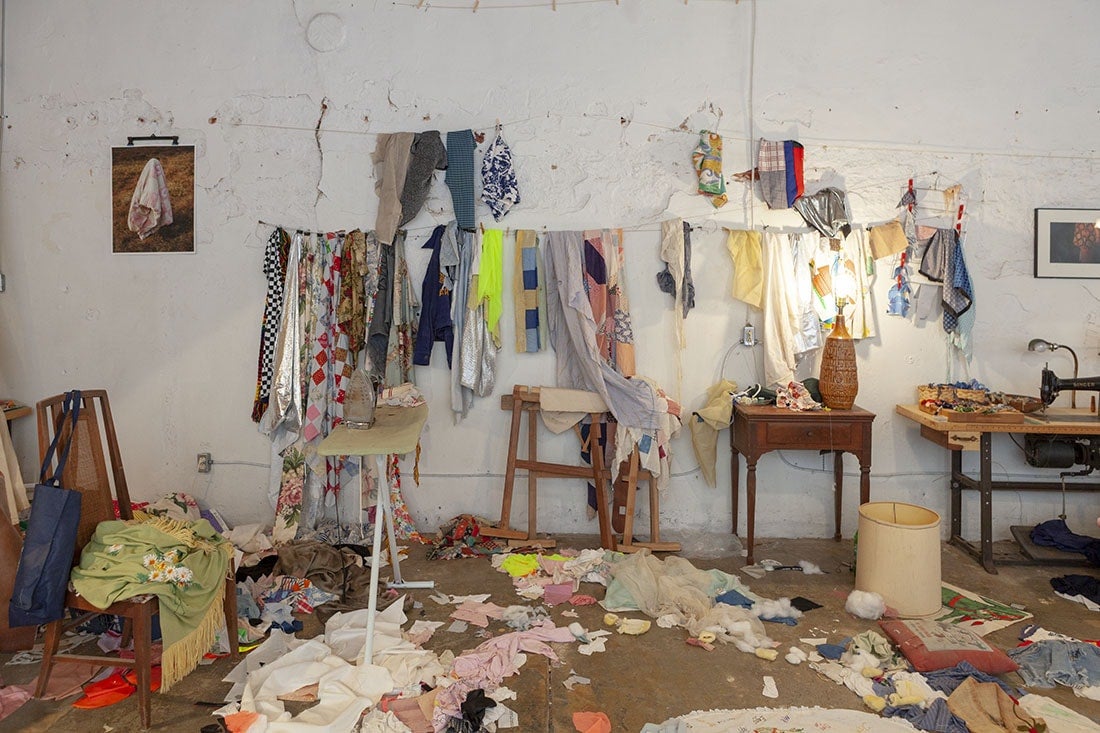
Departing from her training as a painter, Fussell never sketches an idea; she works entirely on instinct. The dimensions of full-sized and twin-sized quilts are marked in painter’s tape on the floor. That is as structural as the studio gets. A quilter is the craft-world’s equivalent of a magpie, and Fussell is no exception. There are heaps of every material you can think of throughout the space, organized in no order that any visitor could understand. The makings of no fewer than six quilts are strewn around the room, along with a pile of torn-up stuffed animals. There is a wall of what Fussell calls “the good stuff,” which includes tacked-up pieces of spandex and sequins. There is—truly—a t-shirt with Willie Nelson’s autograph on it. On a corner of a quilt there are doodles that Fussell asked her sons to do, requesting “some hardcore battle scenes.” Being good sons, they didn’t skimp on blood and even threw in some phallic imagery. This will, naturally, be stitched onto a nineteenth-century wedding band quilt.
Though she has a tenderness for every piece of material that crosses YaloRun’s threshold, Fussell doesn’t have time for pausing for reverence. Her approach is, as another writer recently told me, “generatively agnostic.” The artist seems to have transcended often-paralyzing debates about hierarchies of material prestige and appropriateness. This is not to say her work is unapologetic or impudent—she simply leaves no room for preciousness. Everything is sacred and nothing is sacred. An older quilt in the process of being torn apart, for example, rests in one corner of the room. In between the quilt’s pieced front and back, shrouded in the batting—the cotton that gives quilts weight—was a pristine silk slip, completely undetectable until the full quilt was taken apart. As I tried to skirt the slip (presumably the evidence of some forgotten romantic scandal) in order to photograph it, Fussell waved both hands casually and said, “Oh no, don’t worry. Feel free to step on anything.”
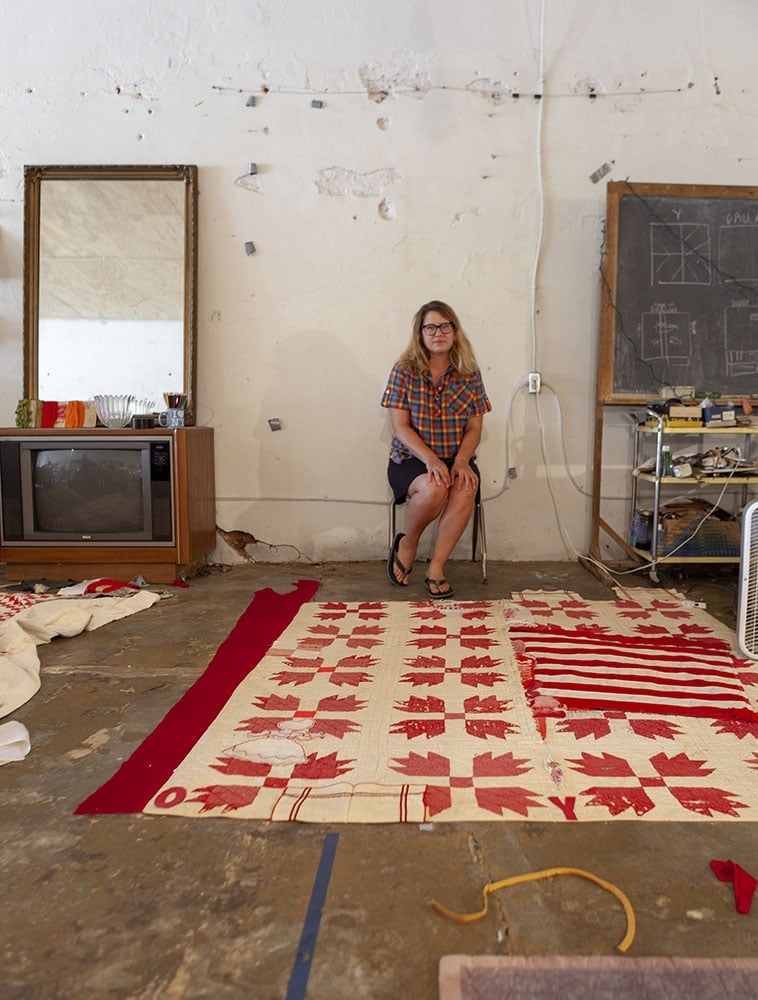
In nearby Oxford, Fussell has worked for nineteen years as a waitress at the Ajax Diner (a staple of life at Ole Miss), sticking as much as possible to tip-heavy weekend shifts. Back in her studio, an apron waits to be pieced into whatever quilt it’s fated for. When it was announced earlier this year that Fussell was a 2019 United States Artists fellow—winning an unrestricted $50,000 grant—she was working a double shift. She got the call, then “went out into the alley to celebrate, went back in, and kept working my section.” She readily discusses that the amount of money given with the award was holistically life changing, and not just for her craft. Fussell used to make what she jokingly calls “rent quilts”: quilts made on commission for which she charged the exact amount of a month’s rent. With a national award now under her belt, she is able to work less frenetically and the ends seem to meet a little easier. Any single mom of two boys would be hard-pressed to keep all these plates in the air while maintaining this caliber of an art practice. And yet, here she is doing it, in western Mississippi.
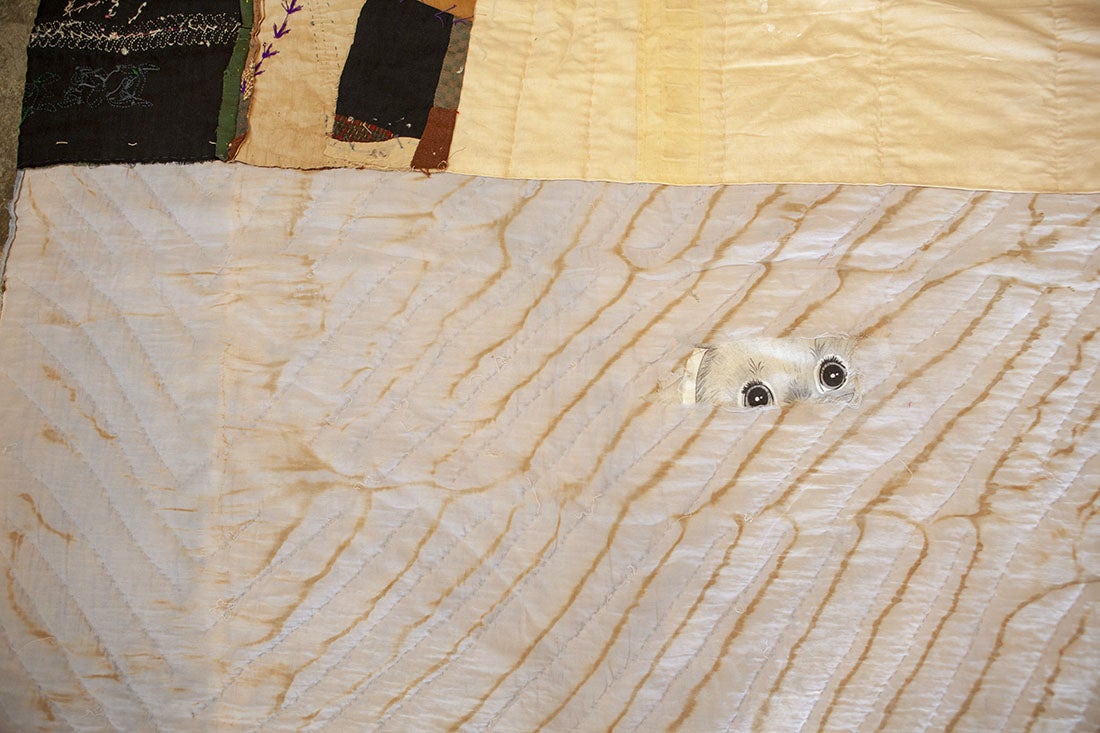
There is a trend in the art world of being in awe of those artists who work outside of major cities, as if the connection to a metropolis is the only way to be generative. Certainly as rural artists become more and more lauded, as Fussell quickly is, living in a small town—southern or not—is often perceived as an idiosyncratic choice. I asked Fussell whether she considers leaving Water Valley. “A lot of people have a whole lot of opinions about the South, but a lot of people don’t live here,” she says. “Besides, my supplies are down here!” This is an understatement. At least once a week, in the poetic dark of the night, there appears a bag of material left on her stoop. A beloved late-grandmother’s quilts. Gymnastics ribbons from a former athlete’s career. A bag of a cheating spouse’s clothes. Astroturf from a derelict stadium. Everything is fair game and all will eventually be pieced into a quilt. These offerings must be comforting for the people making the pilgrimages to leave them: otherwise, why would they continue? From all over the county, people come to the door front marked YaloRun and leave trash bags full of fabric offerings. Perhaps this is the closest Water Valley will get to having a miraculous spring.
Ever practical, however, Fussell has the last word. “Oh, listen. If the clothes are cute, I’m keepin’ ’em.”
Coulter Fussell: The Raw Materials of Escape opens on January 17 at the Halsey Institute for Contemporary Art in Charleston, South Carolina, where it will remain on view through February 29.
This profile originally appeared in Stranger, Harder, Brighter: The 2019 Burnaway Reader. Order your copy here.

